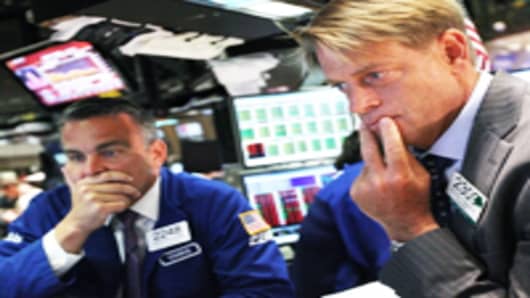In a normal market, the wide disparity between the Dow Jones Industrial Average and technicals would be screaming an ugly message, but these are not normal times.
That's because the massive amount of headline risk—market moves driven by the constant churn of big news events—is at an apex and rendering the aforementioned cornerstone of Dow Theory extremely unreliable...if not useless.
Blame it on Greece, if you will, as the seemingly daily twists and turns to the European debtsaga are essentially the only market movers nowadays.
"In the short term, we know the market is run by headlines and emotions. Dow Theory says that's not the case, but in reality we know that is the case," says Andre Julian, senior market strategist at OpVest Wealth Management. "Whatever happens in Europe is what drives the market. In the very short term, it's tough to look at technicals."
Dow Theory has six basic tenets at its core—entailing market cycles and trends, volume, the discounting of news, and trend confirmation—but perhaps the most widely followed is that any market rally has to be confirmed by the transportation sector. By that measure, the third quarter was an abysmal sign for those hoping the market moves higher.
While the Dow 30 stayed in correction mode—a 10 percent drop from recent highs—transportation stocks were near a full-out bear market, defined as a 20 percent pullback. Transportation stocks are seen as key, because they represent active economic activity on America's air and ground freight systems.
"Insofar as transports are an important part of the market and an important part of the economy, the poor relative action in the sector...is a bearish indicator," Phil Roth, chief technical analyst at Miller Tabak, said in an email. "I wouldn't go so far as to say the market can't do better in the face of the transport action, but it is clearly a big drag and one indication traders are downgrading their economic expectations."
Yet there is reason to believe while the transport activity is an important economic bellwether, it may not matter to the markets.
Investors, according to the popular adage, run on fear and greed, and fear that debt default in Greece would lead to global contagion is the market's driving force. Even amid a plethora of bad news from the U.S. economy last week, stocks rallied on belief that Europe was moving closer to solving the Greek dilemma and removing the risk of another crisis.
Of course, the opposite has been just as true—whenever holes pop through in the latest bailout plans, the market quickly retreats.
"In the absence of concrete and credible action (in Europe), we expect investors’ confidence to continue to be eroded by a vicious circle of declining markets, falling liquidity and declining credit availability, a deteriorating economic outlook, and policy disappointment," Citigroup credit analyst Matt King wrote in a note for clients. "Unfortunately without confidence and with 2008 so fresh in investors’ minds, the value offered by markets counts for little."
Maybe even more to the point is that the market has found a Greece-bound range unlikely to be influenced by anything else, much less time-honored investment tools such as the Dow Theory.
"In the end, this story isn't one that you can throw away. It rears its head every three to four weeks," says J.J. Kinahan, chief derivatives strategist at TD Ameritrade. "As long as you have that continuing story, the whole premise with Dow Theory is thrown off."
Another critical tenet is that the Dow already has priced in the news by the time it hits.
Again, the current market swings of 200, 300, and even 500 points a session indicate that there is plenty left to surprise investors in the current drama being played out in southern Europe.
"The major part of the theory was the charts already have the news in them," Kinahan says. "We don't see that as much anymore."
For investors, that sets up a sturdy challenge.
"We're going to be in a tremendous type of volatility over the next few years," Julian says. "The new normal is having these 2, 3, 4 percent days. That's going to continue. The overall trend eventually will work itself out. But we're really in for a choppy market."
Indeed, the long-term trend may be the bright spot for Dow theorists.
Once the Greek crisis goes away—though that could take years—traditional technical indicators can be useful again.
Until that day arrives, however, investors will have to adjust their perspectives accordingly.
"What it does is it presents some opportunity for the average investor to be a little more selective in the stocks you pick," Kinahan says. "It allows you to accumulate them over time. What they have to be careful of here is not get panicked when things go to the downside."



